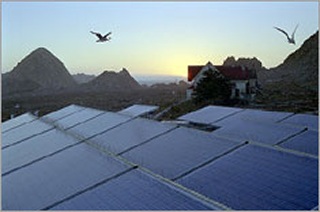These measures could deliver daily oil use savings of more than 22 percent
-- equivalent to the 6.3 million barrels a day America currently imports
from the Persian Gulf, the report claims. Since the transportation sector
alone accounts for more than 70 percent of all U.S. oil use, the study's
recommendations call for the use of biofuels, a push to make plug-in
hybrid vehicles that use cellulosic ethanol or gasoline only as backup,
and the need for more use of hybrid vehicles.
Professor Kammen notes that these currently available and near-term
technologies and policies could make possible even larger oil use savings
than the study projects, if pursued aggressively and consistently.
"We spend over $240 billion a year on foreign oil," cites Chris Wolfe,
RAEL president. "Oil price and availability dictate the value of our
nation's stock markets and our retirement portfolios. Every time we fill
up our cars, we transfer a greater part of our personal and national
wealth to questionable governments. It's time for a change and this study
shows how to start." The RAEL study was funded by a grant from Americans
for Energy Independence (AEI), a nonprofit group dedicated to raising
awareness of America's reliance on imported oil through considering
consequences and solutions.
Americans for Energy Independence will use "Towards Energy Independence in
2025" to spearhead its efforts, making it available to the public and
presenting it to all members of Congress. "We must put energy independence
at the top of our national agenda," Wolfe states. "To achieve it, we must
have a plan of action, we must be willing to change our behaviors and,
most importantly, we must have dedicated leadership to make it happen."
Observing that energy issues have not had significant national discussion
for more than 30 years, Professor Kammen suggests, "We have been negligent
in investing in energy research and development, as well as in ways to
reward clean, domestic sources of power production. This study, and the
vision of Americans for Energy Independence, explores how we can make the
nation more environmentally sound and geopolitically secure."
In addition to projections for oil use savings and the resulting reduction
of oil imports, the study's recommendations could entail a 50 percent
reduction in carbon emissions from light duty transportation (small
trucks, SUVs and similar fleet vehicles), and a related cost savings of
$1.1 trillion.

It does not make sense for us to continue oil dependency by pouring our wealth into foreign countries that harbor ill will to us. We have to stand on our own two feet much as did our pilgrim forfathers or our ancestors who braved the deserts and mountains to found our nation. Personal as well as national pride is at stake.
People did not come to America to continue being subserviant to the countries they left. By being dependent upon foreign oil, we go back to being under this condition which is not really promotive of freedom. America is supposed to be the land of the free and not the land of the "needy oil grubbers". Are we to be slaves of oil?
adrianakau@aol.com